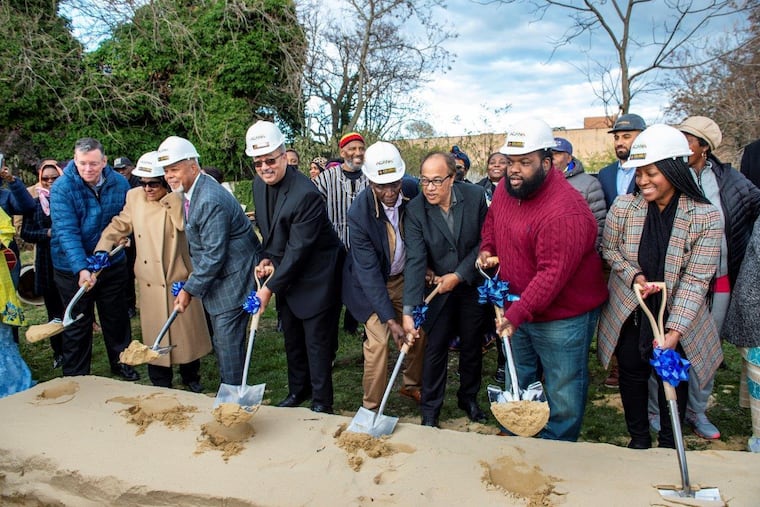A key Southwest Philadelphia block is reimagined as a boon for a revamped ‘Africatown’
A nonprofit and business leaders hope the revitalization at 55th Street and Chester Avenue will spur investment

When Voffee Jabateh looks out at the fenced-off, empty lot off South 55th Street and Chester Avenue in Southwest Philadelphia, he imagines a thriving block on a key commercial corridor featuring a health center, retail space for local entrepreneurs, and low-income housing.
It’s a transformation Jabateh, the founder and CEO of the nonprofit African Cultural Alliance of North America, has been imagining for more than a decade — a way of revitalizing a section of the city he calls Africatown — that will be underway in a matter of months.
“We will be building structures that America is proud of, that African Americans… African immigrants and other Caribbean immigrants who come to this area will be proud of,” Jabateh said.
The development is meant to kickstart reinvestment in a neighborhood known by some as “Little Africa” because of its booming immigrant populations from Liberia, Senegal, and other African and Caribbean countries. Some hope that part of Southwest Philadelphia can transform into a must-visit ethnic enclave, like Philly’s Chinatown.
As of last month, Jabateh’s closer to that vision than ever. Lawmakers presented ACANA with $9 million in state grants from the Redevelopment Assistance Capital Program. The money is for a new headquarters for ACANA, called the Africa Center. Construction for this initial phase of the project is set to begin at the end of February and is estimated to cost $16 million.
“This funding was needed,” said state Rep. Joanna McClinton in an email. “It’s needed because southwest Philadelphia is one of the most diverse areas of the city, home to so many African and Caribbean families who deserve to know their voice, culture and presence make our community beautiful.”
Since the mid-aughts, some have taken to calling the area between South 47th Street and Baltimore Avenue and South 74th Street and Lindbergh Boulevard “Little Africa.”
According to census data, the foreign-born African population in Philadelphia grew tenfold between 2000 and 2021, with latest counts placing the population at almost 29,000. Many settled in Southwest Philly, opening grocery stores and restaurants that featured food from their home countries. Jabateh, a Liberian immigrant himself, has been one of many business leaders featured in media profiles lauding the section of the city and highlighting dishes like fufu and jollof rice.
The problem, Jabateh and others say, is the media attention has yet to translate into the type of investment and patronage they’d like to see. Jabateh thinks some branding tweaks can change that.
For starters, he wants to nix the unofficial Little Africa designation — he finds it a bit demeaning — to Africatown. Also, like Chinatown, he’d like an arch at 60th Street and Woodland Avenue that welcomes people to the area. Still, the most important part of the rebrand is the construction off of 55th Street and Chester Avenue. He wants the new building to be a sort of anchor for the community.
Jabateh plans to call the revamped block Dolakeh Square, a nod in Liberia’s Mano language that roughly translates to “community working together.”
“We’ve been working for this to happen for years,” said Musa Barry, president of the Woodland Avenue Business Association. “I think that’ll be very positive for the community here.”
The plan for the vacant lot would compliment a strip that’s currently home to a handful of beauty salons, a pizza shop, cleaner, tailor, Chinese food store, and a supermarket.
Revamping the better part of the block, however, will cost between $90 and $100 million, according to Jabateh. He declined to comment on other funding sources but said ACANA was optimistic it would be able to raise the money. In all, Dolakeh Square is estimated to take two years to complete once funding is secured.
Terrine Datts, director of community development programs at the city’s Department of Commerce, has been connecting ACANA to potential partners and helping it secure funding for the project, including a $500,000 Neighborhood Economic Development award from the city.
Datts is optimistic about ACANA’s efforts, vision, and support within the community.
“[ACANA’s] actually going in and creating opportunities and revitalizing neighborhoods,” said Datts. “I definitely think the community investment is huge, job creation is phenomenal.”
And while African business leaders and ACANA have been some of the biggest supporters of the project, Jabateh said these efforts are not for the benefit of the African diaspora alone.
“We’re doing it for everybody,” he said. “Every resident of this area will benefit from what we’re doing.”
Staff writer Kasturi Pananjady contributed to this article.